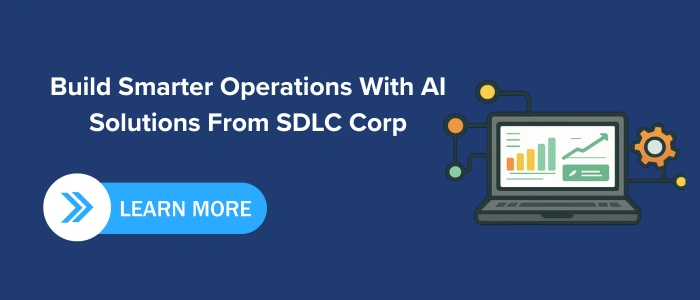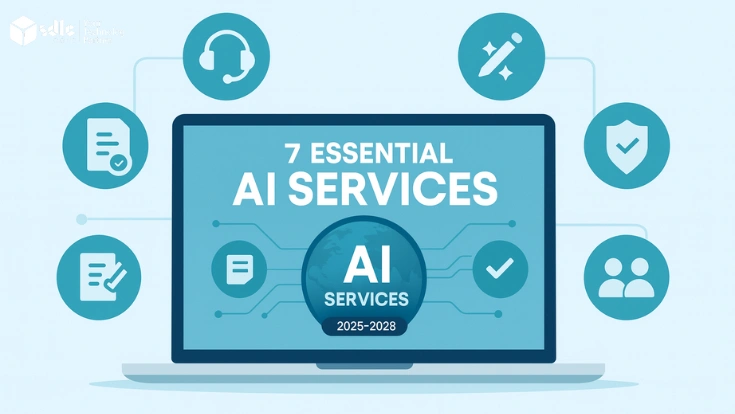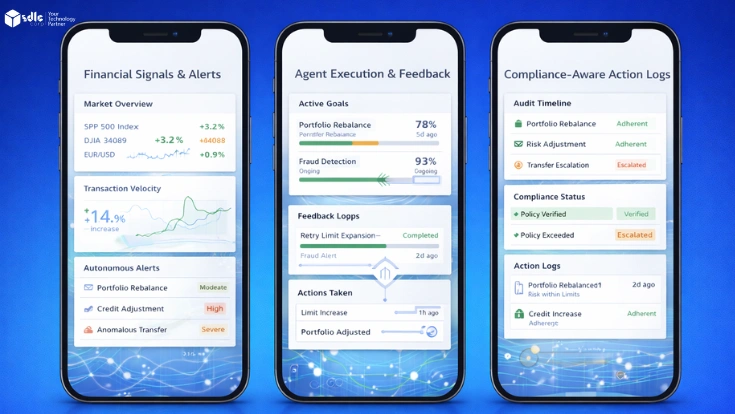Introduction
AI for small business has moved from experimentation to everyday business use. It now helps companies reduce manual effort, improve accuracy, and support faster decisions across teams. Unlike earlier enterprise focused systems, modern AI tools are affordable and easier to deploy. Additionally, these tools integrate smoothly with existing software and workflows. As a result, even small teams can adopt artificial intelligence without large budgets or technical departments. Instead, success depends on selecting the right use cases and applying AI with clear operational goals.
1. What AI Means for Small Businesses Today
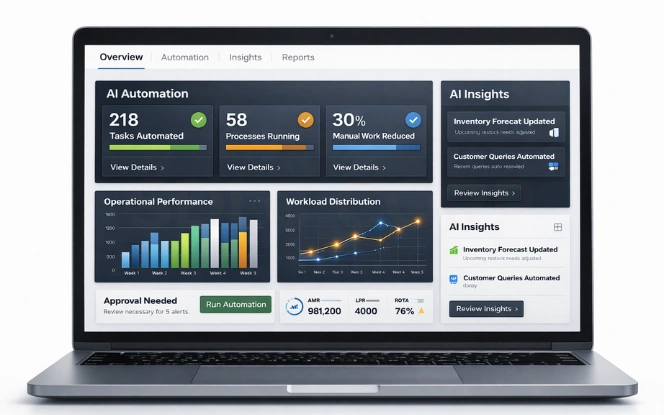
For small businesses, artificial intelligence is not about complex research models or dedicated data science teams. Instead, it focuses on applying proven technologies to daily operational challenges. In practice, AI systems work quietly in the background to support decisions and automate tasks. As a result, businesses gain efficiency without increasing complexity.
- Automation focused deployment
AI platforms emphasize task automation rather than technical depth. Therefore, small businesses use pre trained systems with minimal configuration. As a result, deployment is faster and operational risk remains low.
- Insight generation from existing data
AI analyzes sales, customer, and operational data already stored in systems. Moreover, it identifies trends that manual reviews often overlook. Consequently, decisions become more accurate and timely.
- Scalable control without expansion
AI enables businesses to handle higher workloads efficiently. As a result, growth does not require proportional staff increases. Therefore, operations remain controlled as demand rises.
2. Core Business Problems AI Solves
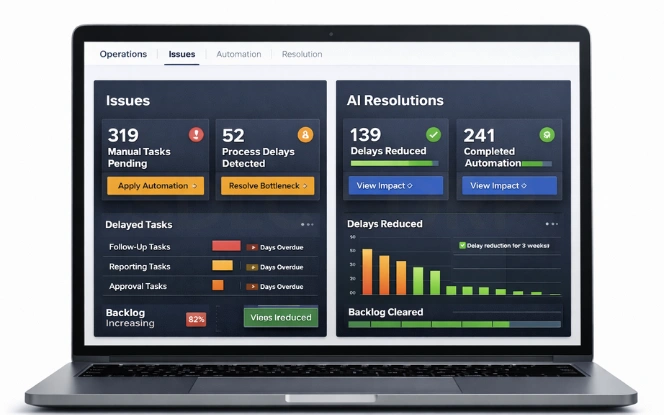
Small businesses often face time pressure, staffing limitations, and disconnected workflows. Because of this, productivity declines as operations scale. However, AI addresses these constraints by standardizing processes and reducing dependency on manual effort. As a result, daily operations become more predictable and manageable.
- Time intensive manual work
AI automates repetitive tasks such as scheduling and data entry. Therefore, employees spend less time on administration. As a result, focus shifts to higher value activities.
- Resource limitations
Hiring increases fixed costs and operational risk. Instead, AI fills capability gaps through automation. Consequently, service quality improves without payroll growth.
- Disconnected workflows
AI connects tools and systems into unified processes. As a result, data flows without delays or duplication. Therefore, execution speed and accuracy improve together.
3. AI in Customer Support and Engagement
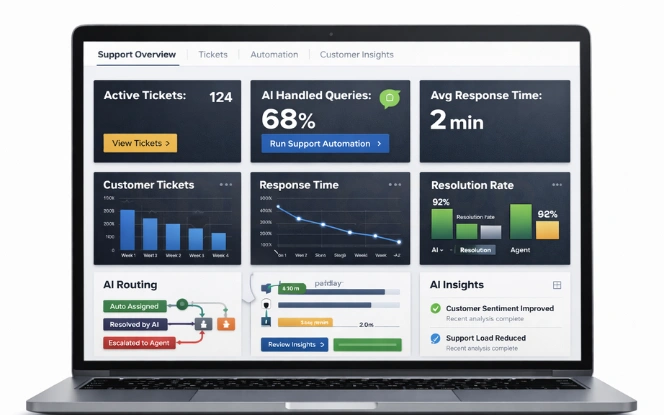
Customer support volume increases as businesses grow. Therefore, AI helps manage demand without compromising service quality. Meanwhile, human teams focus on complex or sensitive cases. As a result, customer experience and efficiency improve together.
- Immediate response capability
AI chat systems answer common questions instantly. As a result, customers receive help without waiting. Therefore, satisfaction improves across support channels.
- Smart issue routing
AI analyzes intent before escalation. Therefore, complex cases reach the right agent faster. As a result, resolution time decreases.
- Early dissatisfaction detection
AI monitors tone and language patterns in conversations. Consequently, frustration signals appear early. Therefore, teams intervene before churn occurs.
4. AI for Marketing and Sales Optimization
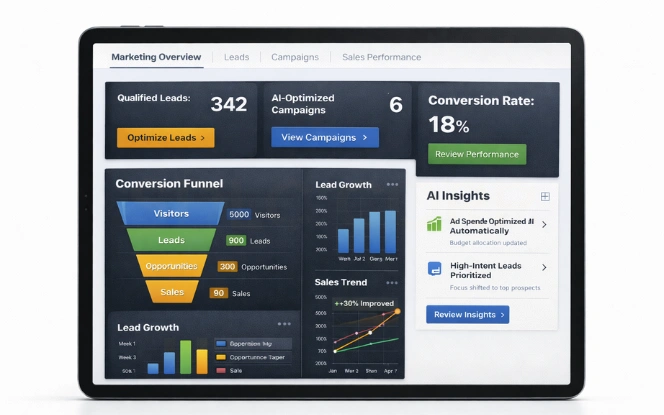
Marketing and sales depend on relevance, timing, and accuracy. However, manual analysis limits performance. AI improves results by continuously learning from customer behavior and campaign data. As a result, decisions become data driven rather than assumption based.
- Customer behavior tracking
AI monitors engagement across digital touchpoints. Therefore, teams understand what content performs best. As a result, messaging becomes more targeted.
- Lead prioritization
AI scores leads using historical conversion data. Therefore, sales teams focus on high intent prospects. As a result, close rates improve.
- Campaign adjustment
AI tests variations in timing and messaging automatically. Consequently, campaigns improve without manual experimentation. Therefore, efficiency increases consistently.
5. Financial Management and Cost Control Using AI
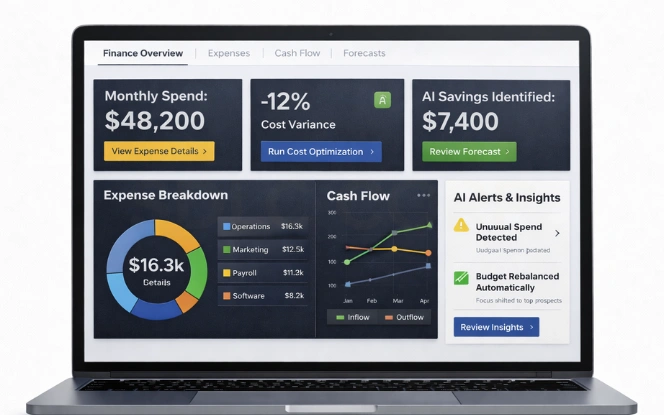
Financial control is critical for small businesses operating on tight margins. Therefore, AI supports planning by analyzing transactions and predicting trends. As a result, financial decisions become more reliable and timely.
- Automated expense tracking
AI categorizes expenses consistently across accounts. As a result, reporting accuracy improves. Therefore, manual errors decrease significantly.
- Cash flow prediction
AI forecasts inflows and outflows using historical data. Therefore, shortages are identified early. As a result, planning becomes proactive.
- Risk identification
AI flags abnormal spending patterns in real time. Consequently, potential issues surface early. Therefore, losses and leakage reduce.
6. Data Analysis and Decision Support
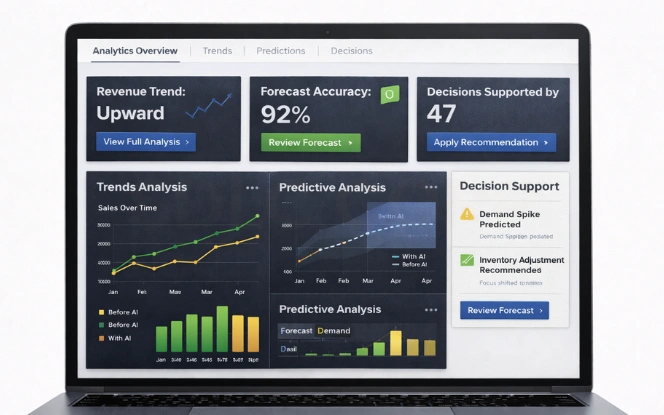
Many small businesses collect data but struggle to extract insights. Therefore, AI converts raw data into structured intelligence. As a result, decisions rely on evidence rather than intuition.
- Simplified dashboards
AI presents performance data in clear visual formats. Therefore, trends are easy to interpret. As a result, decisions are faster.
- Predictive analysis
Machine learning identifies demand shifts and seasonality. Therefore, planning adjusts ahead of time. As a result, surprises reduce.
- Sector adaptability
AI adapts to industry specific requirements such as AI for healthcare. Therefore, accuracy and compliance remain intact.
7. Operational Automation and Workflow Efficiency
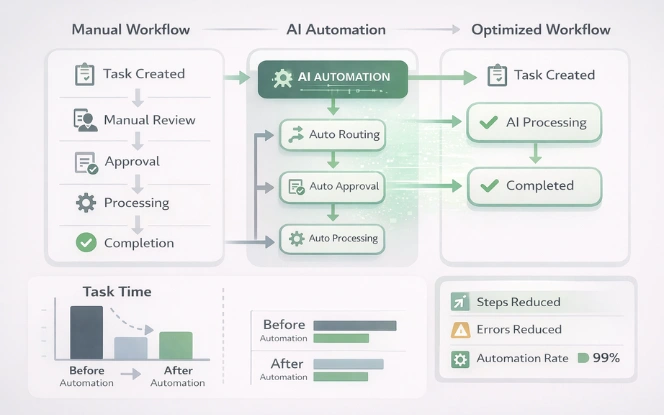
Operational delays often come from manual handoffs and unclear ownership. Therefore, AI enforces structured workflows and process visibility. As a result, execution speed and accountability improve.
- Workflow automation
AI automates approvals, notifications, and task routing. Consequently, processes move without unnecessary delays. Therefore, productivity increases.
- Performance visibility
AI tracks task progress and bottlenecks continuously. Therefore, managers identify issues quickly. As a result, fixes are targeted.
- System integration
AI integrates with ERP platforms like Odoo for small business. As a result, structured data improves automation accuracy. Therefore, operations scale smoothly.
8. Security, Fraud Detection, and Risk Reduction
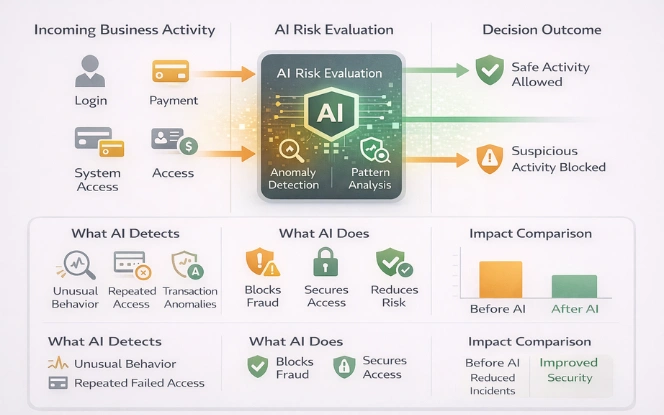
Security risks grow as digital activity increases. Therefore, AI strengthens protection through continuous monitoring and pattern recognition. As a result, threats are detected earlier.
- Continuous monitoring
AI monitors user and transaction behavior in real time. Consequently, anomalies trigger alerts immediately. Therefore, response time improves.
- Pattern based fraud detection
Machine learning identifies recurring fraud indicators. As a result, repeat attacks are detected faster. Therefore, exposure decreases.
- Compliance support
AI logs access and actions automatically. Therefore, audits become easier to manage. As a result, trust and accountability increase.
9. Technical Requirements for AI Adoption
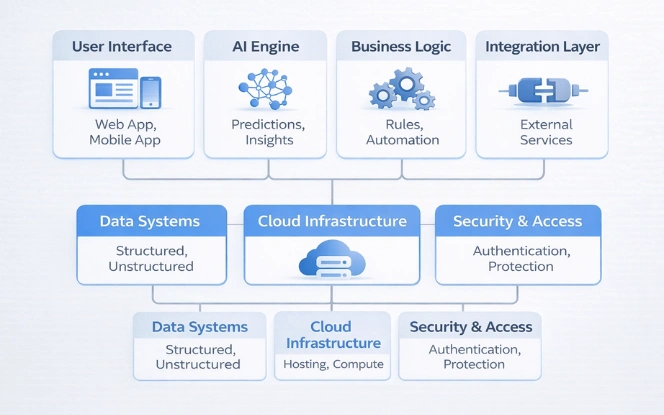
Successful AI adoption depends on preparation, not tools alone. Therefore, businesses must address data quality, integration, and delivery models. As a result, long term effectiveness improves.
- Data quality standards
AI requires clean and structured data inputs. Therefore, duplicates and errors must be removed. As a result, output accuracy increases.
- Integration readiness
APIs allow AI tools to connect with existing systems. Therefore, core platforms remain unchanged. As a result, disruption stays minimal.
- Flexible delivery models
Many businesses adopt scalable options such as AI development services or AI as a Service. Therefore, implementation aligns with growth needs.
10. Common Challenges and How to Overcome Them
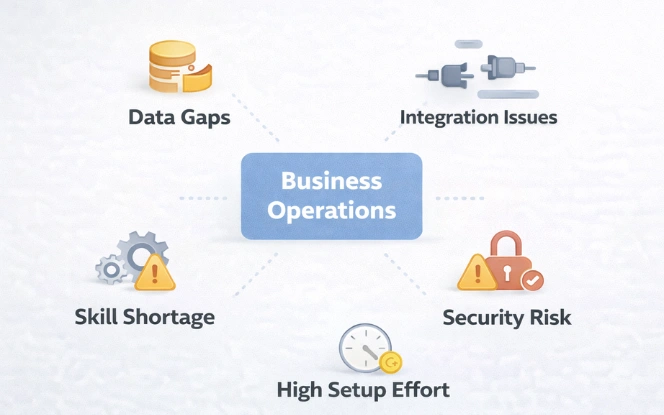
AI adoption presents challenges across cost, skills, and change management. However, most issues stem from planning gaps rather than technology limits. Therefore, a phased approach delivers better outcomes.
- Budget concerns
AI pricing scales with usage levels. Therefore, businesses can start small. As a result, financial risk remains controlled.
- Skill limitations
User friendly tools reduce learning effort. Therefore, teams adapt faster. As a result, confidence grows.
- Change resistance
Clear communication explains benefits early. Therefore, staff trust the system. As a result, adoption improves steadily.
Conclusion
AI for small business is no longer optional. Therefore, it improves efficiency, decision making, and operational control across teams. When applied correctly, artificial intelligence delivers value without unnecessary complexity or disruption. Moreover, success depends on selecting relevant use cases and integrating AI into daily workflows. As a result, small businesses gain sustainable, long term advantages.
For expert guidance on strategy or implementation, contact SDLC Corp to plan your next steps.
FAQs
What Is AI for Small Business and How Does It Work?
AI for small businesses uses software to automate tasks, analyze data, and support decisions. It works by learning from existing business data and applying rules or predictions.
What Are the Main Benefits of AI for Small Business?
The benefits of AI for small business include time savings, better accuracy, and improved efficiency. It helps teams do more work with fewer resources.
How Do Small Businesses Use AI in Daily Operations?
Small businesses use AI for customer support, marketing analysis, financial tracking, and workflow automation. These tools reduce manual effort and speed up operations.
What Are the Best AI Tools for Small Businesses?
AI tools for small businesses include chatbots, analytics platforms, forecasting tools, and automation software. Most integrate easily with existing systems.
Is Artificial Intelligence for Small Businesses Expensive to Implement?
Artificial intelligence for small businesses is cost effective today. Many tools offer scalable pricing, allowing businesses to start small and grow usage gradually.

